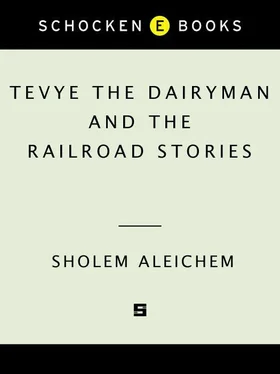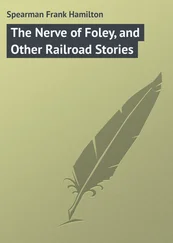292 Koyl yisro’el khaveyrim —“All Jews are brethren.” A rabbinic saying.
293 Hamibli eyn kvorim bemitsrayim —“And they said unto Moses, Are there not enough graves in Egypt that thou hast taken us to die in the wilderness?” Exodus, 14:11.
294 Tovar voborotye —Russian: “The merchandise is moving.”
295 Ulai yerakheym —“Perhaps He will have mercy.” There seems to be no traditional source for this quote.
296 Pshoyt neveyloh … ve’al titstoreykh —“[Better to] skin carcasses in the marketplace [for a living] rather than depend on others.” A Talmudic proverb.
297 Koyl dikhfin yeysey veyitzrokh .
298 Hekhiloysoh linpoyl … nofoyl tipoyl —“Then said his wise men and Zeresh his wife unto him [Haman], If Mordecai be of the seed of the Jews, before whom thou hast begun to fall , thou shalt not prevail against him, but thou shalt surely fall before him.” Esther, 6:13.
299 Tallis kotons .
300 Tomus nafshi im plishtim— “Let me die with the Philistines.” Judges, 16:30.
301 Purishkevitch.
302 A heder teacher — The heder was a schoolroom in which small children were taught beginning subjects, mostly religious ones.
303 The Torah reader — Reading the weekly portion of the Torah in the synagogue is a highly specialized task, as the reader must know by heart the chant notes, vocalization, and punctuation of the text, none of which appear in the Torah scroll itself.
304 Pravozshitelestvo, Gospodin Yevrei —Russian: “Your permit, Mr. Jew!”
305 Khorosho, Gospodin Obradchik—“All right, Mr. Cleric.”
306 Prayer group — Though any Jew can pray privately, ten male Jews (a minyan) are needed for public prayer to be held.
307 Deathday — On the Hebrew anniversary, the yortsayt , as it is called in Yiddish, of a family member’s death, a memorial candle is lit and the male survivors are expected to say the kaddish — which can only be recited in a minyan.
308 Girded his waist — Extremely pious Jews belt their jackets at the waist when they pray, in order to symbolically divide the upper or “spiritual” part of themselves from the lower or “animal” part.
309 Ashrey yoyshvey veysekho ….
310 On the eighth day — The day of life on which, barring illness, all Jewish male children are circumcised. The circumcision too must be performed in the presence of a minyan.
311 Sholem aleykhem —See this page — this page.
312 After the candles had been lit — The lighting and blessing of the Sabbath candles on Friday evening marks the onset of the day of rest.
313 Hallah — The braided bread that is blessed after the wine and the ritual washing of hands at the beginning of the Sabbath meal.
314 But it was the holy Sabbath — Among the many acts prohibited on the Sabbath are lighting and extinguishing a fire. Jewish law, of course, permits the Sabbath to be violated when human life is endangered, but to a sufficiently pious Jew the mere burning down of his house does not fall into that category. Furthermore, though a non-Jew is allowed to put out the fire, the Jew must not openly request him to do so, for that too would be a violation of the Sabbath laws.
315 Chvedka, serdtse —Russian: “dearest Chvedka.”
316 Never before … had he been without a hat.
317 Tefillin.
318 Kiddush wine — The wine, generally sweet, that is blessed at the beginning of Sabbath and holiday meals.
This fragment, which was given the tongue-twisting Hebrew name of Vekhalaklakoys , after the verse in Psalms 35:6, Yehi darkom khoyshekh vekhalaklakoys , “Let their path be dark and slippery,” was written in 1914, the same year as “Lekh-Lekho,” but not published until two years later. Though it seems to have been begun as a genuine sequel to “Lekh-Lekho,” that is, as a ninth episode of Tevye , it is less than a third of the average length of the other stories, repeats much of the material in Chapter 8 without adding anything essentially new, and has a rather tired quality that contrasts with the sparkle of the rest of the book. Still, one cannot call it unfinished; on the contrary, it contains precisely the “finale” that Chapter 8 lacks. In the absence of explanatory biographical material, of which there appears to be none, one can only speculate what this fragment represents. My own guess is as follows: while Sholem Aleichem indeed intended to write a full-length sequel to “Lekh-Lekho” and began it immediately after finishing the latter, he soon, whether because of failing health or because he realized that the book had reached its natural conclusion and had nowhere else to go, gave it up — though not before hastening to write a proper end for it, his main concern being that Tevye should have one. Unhappy with the results, however, he refrained from publishing this, possibly hoping to revise and expand it; yet ultimately, seeing this was not to be, he consented to its publication in the days before his death. Subsequently, in all the Yiddish editions of Tevye printed after Sholem Aleichem’s death, the Vekhalaklakoys fragment has appeared as its last chapter.
As the translator of Tevye , I was in a dilemma. On the one hand, Vekhalaklakoys was published by Sholem Aleichem himself in his lifetime, and without it Tevye has no real end; yet on the other hand, apart from its last page, not only does it add nothing to the remainder of the work, it qualitatively detracts from it. What was one to do? In the end I decided to follow the example of Frances Butwin’s 1948 English translation of Tevye and to omit most of the fragment some six pages of Yiddish text in all, retaining only the final coda, which I spliced on to the end of “Lekh-Lekho,” adding several lines of my own to make the transition smoother. Though taking such a liberty in translating a classic of world literature may seem presumptuous to some readers, I would like to think that Sholem Aleichem might have welcomed it. Besides always being open to criticism of his work, frequently revising it as a result, he encouraged his Russian and Hebrew translators, whom he personally helped and advised, to be extremely free in their renditions. Anyone comparing his Yiddish with the Hebrew translations by his son-in-law Y. D. Berkovits, for example, and especially with Berkovits’ translation of Tevye , in which Sholem Aleichem was an active collaborator, will be struck by the enormous differences between them. (Berkovits himself omitted the Vekhalaklahoys fragment entirely in his complete Hebrew edition of the novel, which he ended with “Lekh-Lekho,” but this was apparently his own decision, made after Sholem Aleichem’s death.) There will no doubt come a time for variorum editions of Tevye in which the full text of Vekhalaklakoys can appear alongside whatever ending the translator cares to give the book.
Apart from this fragment, I have departed (as did Berkovits) from the standard Yiddish text of Tevye in one other place. When the first episode of the book, “Tevye Strikes It Rich,” was published in 1894, it was accompanied by a brief preface, purporting to be a letter written by Tevye to Sholem Aleichem, the literary purpose of which was to introduce Tevye to the reader. Though this preface was later republished as part of the novel as a whole, it was clearly written for “Tevye Strikes It Rich” alone, makes no reference to any of the stories that come after it, and cannot possibly be construed as applying to them. I have therefore omitted it.
Читать дальше












